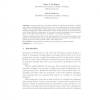4835 search results - page 42 / 967 » Refactoring Functional Programs |
235
Voted
ICFP
2009
ACM
16 years 2 months ago
2009
ACM
Functional logic programming and probabilistic programming have demonstrated the broad benefits of combining laziness (non-strict evaluation with sharing of the results) with non-...
124
Voted
ICSE
2010
IEEE-ACM
15 years 7 months ago
2010
IEEE-ACM
The efficacy of mutation analysis depends heavily on its capability to mutate programs in such a way that they remain executable and exhibit deviating behaviour. Whereas the forme...
95
Voted
GPCE
2009
Springer
15 years 6 months ago
2009
Springer
Programs can be composed from features. We want to verify automatically that all legal combinations of features can be composed safely without errors. Prior work on this problem a...
128
click to vote
JUCS
2007
15 years 2 months ago
2007
: Program slicing is a well known family of techniques intended to identify and isolate code fragments which depend on, or are depended upon, specific program entities. This is pa...
140
click to vote
LISP
2008
15 years 2 months ago
2008
Higher-order logic proof systems combine functional programming with logic, providing functional programmers with a comfortable setting for the formalization of programs, specifica...

